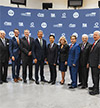Work Force Development Programs Can Make or Break a Site Selection Deal
With scant time and resources for recruiting and training workers, companies are looking at states that will help them to quickly satisfy their labor force needs.
Q3 / Summer 2013
“Some companies have strong internal training resources,” says Buzz Canup, founder of Canup and Associates in Greenville, S.C. “However, many businesses are very lean today when it comes to designing, developing, and implementing their own training programs and rely on outside assistance.”
Most site selection consultants would agree that only a handful of states do an outstanding job at work force training and development. Many of these programs are in the South, including Georgia, Alabama, Louisiana, and North and South Carolina, and serve as models for other states.
“These programs work so well because the states individualize training initiatives to meet the needs of companies,” comments Larry Gigerich, managing director for Ginovus in Indianapolis. “The states design and deliver the curriculum to new employees, based upon the specific needs of the company. These states also have the ability to provide physical space for training activities, as well as training manuals for use on an ongoing basis. There is also a strong emphasis on meeting the certifications and credentials that companies require for their employees.”
Providing state resources to effectively meet a company’s work force training needs is a win/win situation. “Through their business investments in capital, plant operations, business purchases, and employee payrolls, these companies will generate a significant return on investment for the state,” indicates Gary Perilloux, press secretary for Louisiana Economic Development. “For that reason Louisiana developed FastStart®, our turnkey training program, to help companies become more successful, and to help Louisiana become more prosperous.”
The South Leads the Way
The South, without question, is the leader in state-run work force development programs. Many of these states provide well-funded, centralized, mobile, and flexible training departments that custom-design materials and programs to meet a company’s needs. This training is typically free of charge to employers that meet state requirements for job creation, and helps offset location or expansion costs.
“Other states may try to make the same kind of presentation,” says Canup, “but they don’t have same level of experience or a central training group. Some just work through a technical college and only rely on the capabilities of an individual educational institution. Success varies with this approach. Some colleges do a really good job, but others don’t — it is difficult to maintain statewide consistency with this kind of system.”
In 1961 South Carolina became the first state to create a centralized, state-supported work force development group to work with new and existing businesses. The program operates through the South Carolina technical college system.
“The South Carolina program has been very successful over the years and was instrumental in developing new industries after the state’s textile industry went overseas,” states Canup. “The program is especially skilled at developing training and operating procedures for advanced manufacturing plants.”
Today the program is called readySC™ and provides recruiting, screening, and training for employees that is custom-designed to meet a company’s needs. Since its inception, the program has trained about 270,000 employees for more 2,000 companies. Jason Premo, owner of ADEX Machining Technologies in Greenville, first learned about readySC from the Greenville Chamber of Commerce and Greenville Technical College. “It’s challenging for small companies like us to work on a lot of the internal development that’s needed because we don’t have the internal resources or budgets that larger companies do,” says Premo.
“We’ve been leveraging the resources readySC provide for free to train our leadership team and our associates on the factory floor. This has helped us grow and actually create more jobs faster than we would have on our own.”
In the late 1960s, Georgia initiated a similar program called Quick Start, which provides free work force training services to qualified businesses in the state. A company’s training needs are determined through a project analysis that often requires an on-site visit to determine any processes or technologies that might need to be adapted to an operation in Georgia. A training plan is then submitted to the company.
“Quick Start designs pre-employment training, assessment, and selection processes that enable client companies to attract, assess, and select the best applicants according to company-defined criteria,” says Rodger Brown, executive director for marketing for Georgia Quick Start. “Our training professionals work with company leadership and subject-matter experts to develop and deliver performance-based training on the company’s own equipment and processes, using the latest training materials and methodologies.”
A good example is Caterpillar’s new $200 million, 1,400-employee manufacturing facility in Clarke and Oconee counties. The company relied on Quick Start and Athens Technical College to set up a state-of-the-art training facility, including a mock assembly line.
“As we hire employees and bring them in, every employee, including myself and members of my management team, will go through that simulated work environment,” says Todd Henry, manager for the Athens plant. “It not only teaches the hands-on skills that we need to assemble our equipment, but also the principles of the Caterpillar production system, which is really the backbone of our manufacturing operation.”
In Louisiana, FastStart™ provides customized employee recruitment, screening, training development, and training delivery at no cost to companies that meet eligibility requirements and are aligned with Louisiana's economic development targets — especially digital media, software development, service industries, advanced and traditional manufacturing, warehouse and distribution/logistics, and research and development. So far, after four years of operation, FastStart has provided 18,000 workers with more than 225,000 hours of training and instruction.
“A key component to FastStart is that it does not box companies into a preconceived program,” says Perilloux. “Each client is unique and benefits from a highly customized approach that captures the culture and priorities of the organization and delivers the proper amount and type of training.”
In 2010 Paris-based Gameloft, a leader in digital gaming, was considering a number of U.S. sites for a new game development studio, including New Orleans. The company placed a high priority on selecting an area with a pool of young talent and an enriching lifestyle. In response, FastStart designed a custom website that included an overview video about Gameloft. Within two months, these efforts attracted more than 60,000 page views, two million impressions, and 1,700 job applicants. Most importantly, nearly 700 of these applicants were highly qualified and possessed the skills Gameloft required. As a result, Gameloft selected New Orleans for its development studio.
"FastStart is a very experienced group of people that helped us brainstorm and find ideas for hiring staff,” indicates Samir El Agili, Gameloft’s general manager for the United States and South America. “We’ve been constantly impressed with the amount of work they've done — whether it's print ads, social media sites, or film. It's great to work with them."
Other States Are Catching On
Site selection consultants have noticed that a number of other states — including Indiana, Iowa, Kansas, Kentucky, Tennessee, Colorado, Idaho, New Mexico, Texas, Arizona, Oregon, and Utah — are also accomplishing good things with their work force development programs.
“Work force development has been a pivotal site selection determinant for a number of our site selection projects over the years,” indicates John H. Boyd, principal with The Boyd Company in Princeton, N.J. “Among our clients, I would point to the effectiveness of Arizona's work force development program in its support of Progressive Insurance's policyholder service center in Phoenix.”
Arizona's Job Training Program is a reimbursable grant program that supports the design and delivery of job-specific customized training. “Clients can apply for grants that return up to 75 percent of the costs of training net new employees,” says Boyd. “Training that upgrades the skills of our clients' existing employees can be reimbursed up to a maximum of 50 percent.”
In Oregon, Business Oregon connects companies with the state's network of community colleges for training. “Our Royal Caribbean Cruises client benefited from this program during the start-up of its new customer service center in Springfield,” adds Boyd. “The college contracts directly with the client and training programs take place either on campus or at our clients’ office or plant.”
Utah is also coming on strong. Its Custom Fit program, which is a partnership that includes the Utah College of Applied Technology, other academic institutions, and local business communities, assists companies with a variety of training costs. The state also just passed legislation to create and fund a $10 million STEM Action Center, whose goal is to build a highly capable work force for industries that require employees with strong education in science, technology, engineering, and math (STEM). The state currently has a shortage of STEM-savvy workers and hopes the action center will help close STEM education achievement gaps in both public and postsecondary education.
“The STEM Action Center will be a hub of collaboration for communities, industries, higher education, and public education,” says Carol George, Utah’s state science advisor. “The essential goal of this legislation is producing a college-educated STEM work force that can meet the needs of our growing high-tech industries, including medical devices, software development, and biotechnology.”
Project Announcements
Spartan Composites Plans Saltillo, Mississippi, Manufacturing Operations
02/14/2026
Hydrite Purchases Plans Laurens, South Carolina, Operations
02/13/2026
Blue Pony Energy Plans Lovington, New Mexico, Synthetic Fuel Operations
02/13/2026
James Composites Plans Marshall County. Kentucky, Manufacturing Operations
02/13/2026
Joby Aviation Plans Vandalia, Ohio, Operations
02/09/2026
Siemens Energy Plans Fort Payne, Alabama, Manufacturing Operations
02/09/2026
Most Read
-
Top States for Doing Business in 2024: A Continued Legacy of Excellence
Q3 2024
-
Data Centers in 2025: When Power Became the Gatekeeper
Q4 2025
-
Speed Built In—The Real Differentiator for 2026 Site Selection Projects
Q1 2026
-
Preparing for the Next USMCA Shake-Up
Q4 2025
-
Tariff Shockwaves Hit the Industrial Sector
Q4 2025
-
The New Industrial Revolution in Biotech
Q4 2025
-
Strategic Industries at the Crossroads: Defense, Aerospace, and Maritime Enter 2026
Q1 2026



